|
|
The Assembly of the Holy, Glorious and All-praised Apostles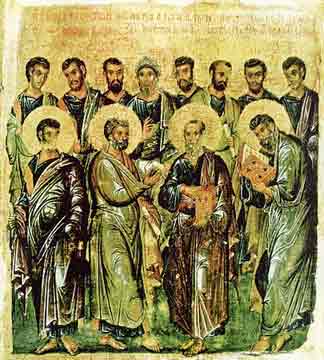 Although each of the Twelve Apostles has his own Feast Day during the year, the Church has set aside this day for a general Feast of all of them together, including St Paul. The names and Feast Days of the Twelve are:
Peter - June 29th and January 16th.
Andrew - November 30th.
James the Son of Zebedee - April 30th.
John the Theologian - September 26th and May 8th.
Philip - November 14th.
Bartholomew - June 11th and August 25th
Thomas - October 6th.
Matthew the Evangelist - November 16th.
James the Son of Alphaeus - October 9th.
Thaddeus (or Jude the brother of James) - June 19th.
Simon the Zealot - May 10th.
Matthias - August 9th.
Paul -June 29th.
Let us also remember here how these most holy and selfless men in the history of the world died and finished their earthly course:
Peter was crucified upside-down.
Andrew was crucified.
James was beheaded.
John the Theologian died in a wondrous way.
Philip was crucified.
Bartholomew was crucified, then flayed and beheaded.
Thomas was pierced with five spears.
Matthew was burned by fire.
James the Son of Alphaeus was crucified
Thaddeus was crucified.
Simon the Zealot was crucified.
Matthias was stoned, then beheaded with an axe when dead.
Paul was beheaded. Although each of the Twelve Apostles has his own Feast Day during the year, the Church has set aside this day for a general Feast of all of them together, including St Paul. The names and Feast Days of the Twelve are:
Peter - June 29th and January 16th.
Andrew - November 30th.
James the Son of Zebedee - April 30th.
John the Theologian - September 26th and May 8th.
Philip - November 14th.
Bartholomew - June 11th and August 25th
Thomas - October 6th.
Matthew the Evangelist - November 16th.
James the Son of Alphaeus - October 9th.
Thaddeus (or Jude the brother of James) - June 19th.
Simon the Zealot - May 10th.
Matthias - August 9th.
Paul -June 29th.
Let us also remember here how these most holy and selfless men in the history of the world died and finished their earthly course:
Peter was crucified upside-down.
Andrew was crucified.
James was beheaded.
John the Theologian died in a wondrous way.
Philip was crucified.
Bartholomew was crucified, then flayed and beheaded.
Thomas was pierced with five spears.
Matthew was burned by fire.
James the Son of Alphaeus was crucified
Thaddeus was crucified.
Simon the Zealot was crucified.
Matthias was stoned, then beheaded with an axe when dead.
Paul was beheaded.Blessed Peter the Heir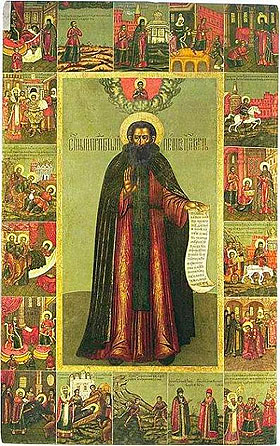 A Tartar by race and the nephew of the Tartar King Berkai, he once listened to a sermon on salvation by Kiril, Bishop of Rostov, and the words embedded themselves deeply in his heart. When he saw the miraculous healing of Berkai's son by Kiril's prayers, he secretly left the Golden Horde and ran off to Rostov, where he was baptised and devoted himself heart and soul to the ascetic life and to training himself in faith and devotion. Once he spent the night on the shore of a lake, and the Apostles Peter and Paul appeared to him in his sleep and told him to build a church dedicated to their memory on that spot, giving him the money he would need to accomplish this. Peter built a beautiful church there, and was there made a monk in old age, after the death of his wife. He finished his earthly course peacefully on June 29th, 1290, and his church became and remains the Petrovski monastery. A Tartar by race and the nephew of the Tartar King Berkai, he once listened to a sermon on salvation by Kiril, Bishop of Rostov, and the words embedded themselves deeply in his heart. When he saw the miraculous healing of Berkai's son by Kiril's prayers, he secretly left the Golden Horde and ran off to Rostov, where he was baptised and devoted himself heart and soul to the ascetic life and to training himself in faith and devotion. Once he spent the night on the shore of a lake, and the Apostles Peter and Paul appeared to him in his sleep and told him to build a church dedicated to their memory on that spot, giving him the money he would need to accomplish this. Peter built a beautiful church there, and was there made a monk in old age, after the death of his wife. He finished his earthly course peacefully on June 29th, 1290, and his church became and remains the Petrovski monastery.Our Holy Father George the Georgian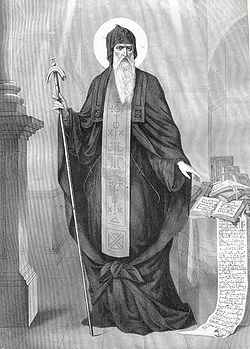 Born in Iberia or Georgia in 1014, he was a kinsman of the Georgian king, Bagrat. He received a good classical education in his early years, but his heart ever drew him towards the spiritual life. He laboured in asceticism under the renowned spiritual teacher George on the Black Mountain. He then went off to the Holy Mountain and continued his asceticism in the monastery of Iviron, becoming the abbot of that monastery. With the assistance of the Byzantine Emperor, Constantine Monomachus, he restored Iviron and roofed the church with lead. This same leaden roof remains to this day. He translated the Holy Scriptures, the Prologue and the books for Divine Service into Georgian. Bagrat summoned him back to Georgia to teach the people, and he received a royal welcome in his homeland. He travelled far and wide, instructing the clergy and the people. Reaching old age, he desired to depart this life on the Holy Mountain and set out on the road, but death overtook him in Constantinople in 1067. His relics were taken to Iviron. Although he died on May 24th, the Georgians celebrate his memory on June 30th, counting him as equal to the apostles. Born in Iberia or Georgia in 1014, he was a kinsman of the Georgian king, Bagrat. He received a good classical education in his early years, but his heart ever drew him towards the spiritual life. He laboured in asceticism under the renowned spiritual teacher George on the Black Mountain. He then went off to the Holy Mountain and continued his asceticism in the monastery of Iviron, becoming the abbot of that monastery. With the assistance of the Byzantine Emperor, Constantine Monomachus, he restored Iviron and roofed the church with lead. This same leaden roof remains to this day. He translated the Holy Scriptures, the Prologue and the books for Divine Service into Georgian. Bagrat summoned him back to Georgia to teach the people, and he received a royal welcome in his homeland. He travelled far and wide, instructing the clergy and the people. Reaching old age, he desired to depart this life on the Holy Mountain and set out on the road, but death overtook him in Constantinople in 1067. His relics were taken to Iviron. Although he died on May 24th, the Georgians celebrate his memory on June 30th, counting him as equal to the apostles.New Martyr Michael (Paknanas) the Gardener, of Athens (1770)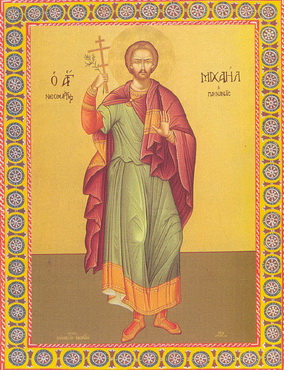 The Martyr Michael the Gardener suffered under the Turks for confessing the Christian faith at Athens in the year 1770. The Martyr Michael the Gardener suffered under the Turks for confessing the Christian faith at Athens in the year 1770.Martyr Meleton
St. Andrew, prince of Bogoliubsk (1174)Martyr Peter of Synope
Holy Queen Dinar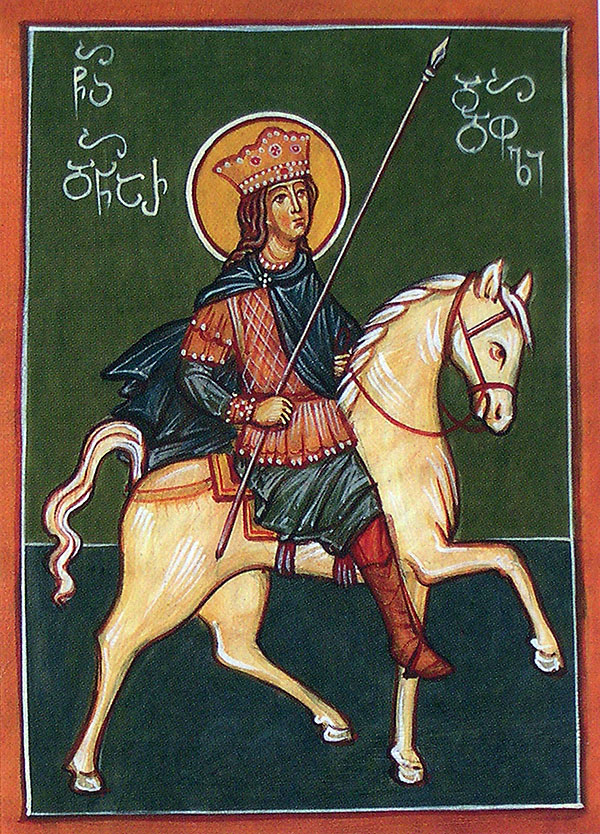 The Russian Church has preserved chronicles of the life of Queen Dinar, a woman who achieved much on behalf of the Christian Faith. For years scholars have disputed about the historical figure discussed in great depth in the Russian Church. Many believed that the sources described Holy Queen Tamar, but the period of Tamar’s rule does not match that of the figure described in the chronicles. The Georgian chronicle Life of Kartli, however, has preserved information about a certain Dinar, Queen of Hereti (southeastern Georgia), who, along with her son Ishkhanik, converted Hereti to the Orthodox Faith and delivered its people from the Monophysite heresy in the 10th century. Queen Dinar’s story resembles that recounted in the Russian Chronicles more closely than any other... The Russian Church has preserved chronicles of the life of Queen Dinar, a woman who achieved much on behalf of the Christian Faith. For years scholars have disputed about the historical figure discussed in great depth in the Russian Church. Many believed that the sources described Holy Queen Tamar, but the period of Tamar’s rule does not match that of the figure described in the chronicles. The Georgian chronicle Life of Kartli, however, has preserved information about a certain Dinar, Queen of Hereti (southeastern Georgia), who, along with her son Ishkhanik, converted Hereti to the Orthodox Faith and delivered its people from the Monophysite heresy in the 10th century. Queen Dinar’s story resembles that recounted in the Russian Chronicles more closely than any other... |